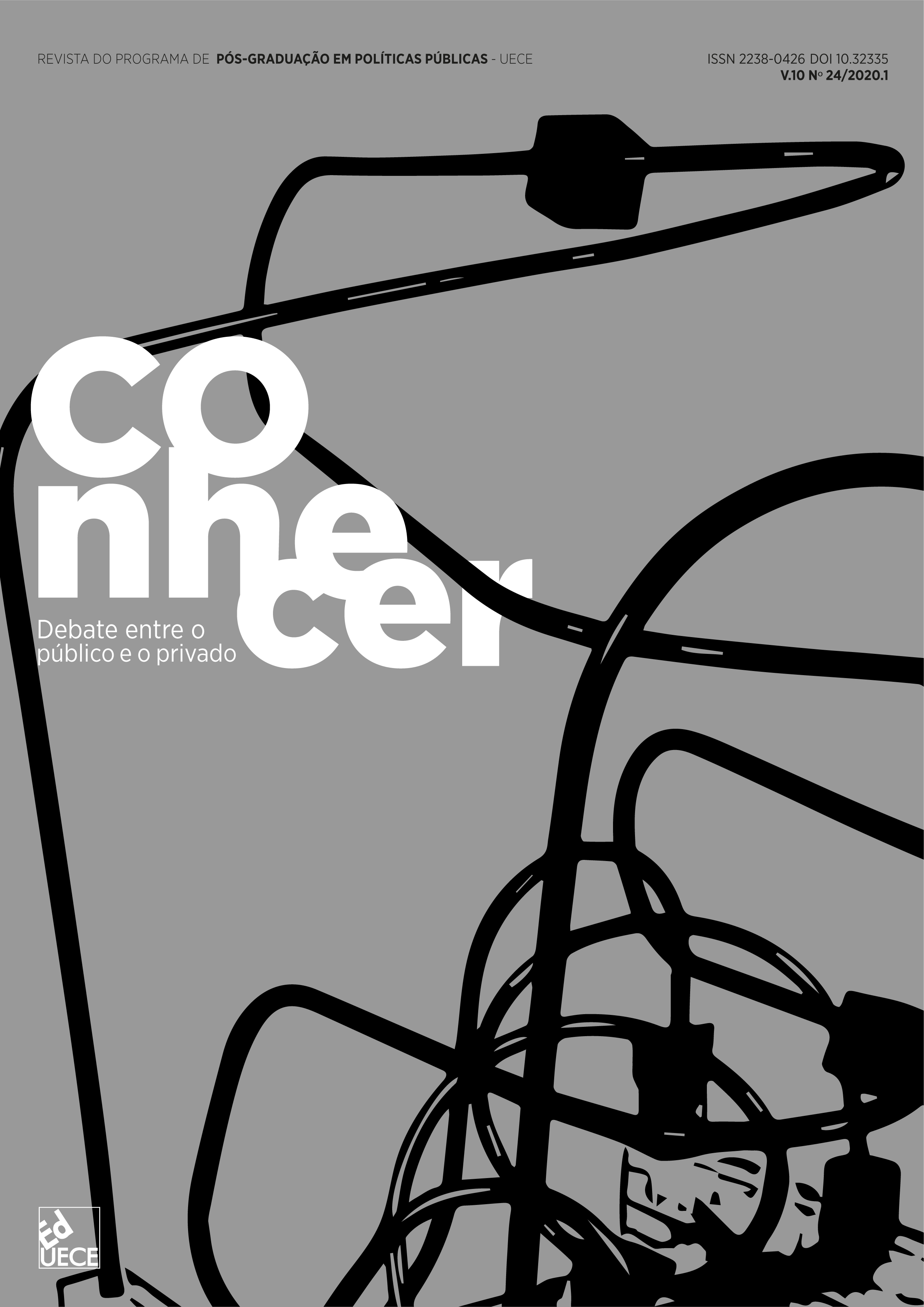Del totalitarismo al populismo:
el enemigo antiliberal en el discurso de derecha
DOI:
https://doi.org/10.32335/2238-0426.2020.10.24.2686Keywords:
populism, antipopulism, neoliberalism, democracy, anti-liberalism, mario vargas llosaAbstract
This article examines the concept of ‘populism’ in the light of its neoliberal opponents’ discourse. The heuristic scope of the term, which its current political use has been devaluing, both in lay and scientific debates, is put into question. Starting from Quentin Skinner’s theory, we propose a political reading of the concept and postulate that its use (and, therefore, the content assigned to it) teaches us much (or more) about the person, movement, or party using it than about the party or the person that it designates. The anti-populist discourse is at the same time a rejection of the people/ethnos (nationalism as the essence of populism), a denial of the people/démos (populism as a pathology of democracy because it establishes the tyranny of majority against the elite), an accusation of the people/pléthos (the fragile mass manipulated by a leader and the intellectuals), and a critique of the ‘idolatry of State’ on the part of populists who oppose economic liberalism in the name of an obsessive egalitarianism. We conclude that ‘populism’ is a ‘kampfbegrief’ (a ‘battle concept’), as totalitarianism once was and it may be seen as a continuation of Cold War anticommunism.
Downloads
References
Andurand, A., & Boisard, S. (2017). El papel de internet en la circulación del ideario neoliberal: una mirada a las redes de think tanks latinoamericanos de las dos últimas décadas. Recuperado de https://journals.openedition.org/nuevomundo/71443
Angenot, M. (2014). La rhétorique de la qualification et les controverses d’étiquetage. Recuperado de https://journals.openedition.org/aad/1787
Balibar, E. (2015). Du populisme au contre-populisme: histoire et stratégie. Recuperado de http://www.populismus.gr/wp-content/uploads/2015/05/interventions3-balibar.pdf
Berstein, S., & Becker, J. J. (1987). Histoire de l’anti-communisme en France (Tome 1: 1917-1940). Paris, France: Olivier Orban.
Boisard, S. (2017). La matriz antiliberal en las derechas radicales: el caso del Frente Nacional Patria y Libertad en Chile (1971-1973). Recuperado de http://journals.openedition.org/nuevomundo/69124
Bustamante, G. A. (2013). El proyecto Chávez (1999-2007). Participación, isocracia e integración regional. Santiago, Chile: Ed. Universitaria.
Calderón, G. (2017). Ecuador: la revolución, el buen vivir y la tiranía de ingenieros sociales. In Á. Vargas Llosa (Coord.), El estallido del populismo (pp. 197-224). Barcelona, España: Planeta.
Castro-Rea, J. (2018). Escrever com a direita: os best sellers da direita no espanhol e sua promoção nas redes transnacionais. In E. Bohoslavsky, R. P. S. Motta, & S. Boisard (Dirs.), Pensar as direitas na América Latina (p. 144-160). São Paulo, SP: Alameda.
De la Torre, C. (2017). Populismos: una inmersión rápida. Barcelona, España: Tibidabo.
De la Torre, C., & Arnson, C. (2013). Latin American populism in the twenty-first century. Washington, DC: Woodrow Wilson Center.
Germani, G., Ianni, O., & Torcuato, D. T. (Eds.). (1973). Populismo y contradicciones de clase en Latinoamérica (Serie Popular). México, DF: Era.
Gini, C. (1935). Prime linee di patologia economia. Milano, Italia: Giuffrè.
Hall, S. (2008). Le populisme autoritaire. Puissance de la droite et impuissance de la gauche au temps du thatchérisme et du blairisme. Paris, France: Amsterdam.
Harneker, M. (2004). Venezuela. Una revolución sui géneris. Madrid, España: Viejo Topo.
Hawkins, K. A., Carlin, R. E., Littvay, L., & Kaltwasser, C. R. (Dirs.). (2018). The ideational approach to populism: concept, theory, and analysis. London, England: Routledge.
Hayek, F. (1988). The Fatal Conceit: The Errors of Socialism. Chicago: University of Chicago Press.
Hirschman, A. (1991). The rhetoric of reaction: perversity, futility, jeopardy. Cambridge, MA: The Belknap Press of Harvard University Press.
Ionescu, G., & Gellner, E. (Dirs.). (1969). Populismo y sus significados y características nacionales. Buenos Aires, Argentina: Amorrortu.
Kaiser, A. (2014). La fatal ignorancia. La anorexia cultural de la derecha frente al avance ideológico progresista. Madrid, España: Unión Editorial.
Kaiser, A., & Álvarez, G. A. (2016). El engaño populista. Por qué se arruinan nuestros países y cómo rescatarlos. Barcelona, España: Planeta.
Kaltwasser, C. R., Taggart, P., Espejo, P. O., & Ostiguy, P. (Dirs.). (2017). The Oxford handbook of populism. Oxford, England: Oxford University Press.
Krauze, E. (2017). Los redentores no cambian. In Á. Vargas Llosa (Coord.), El estallido del populismo (pp. 53-80). Barcelona, España: Planeta.
Laclau, E. (2005). On populist reason. London, England: Verso.
Larroulet, V. C. (2017). ¿Se aleja el fantasma? In Á. Vargas Llosa (Dir.), El estallido del populismo (pp. 287-308). Barcelona, España: Planeta.
Lechín, J. C. (2017). Evo Morales, monarquía plebeya o monarquía lumpen. In Á. Vargas Llosa (Dir.), El estallido del populismo (pp. 235-258). Barcelona, España: Planeta.
Lipset, S. M. (1963). The political man: the social bases of politics. Garden City, MI: Doubleday.
Machefer, P. (1974). Ligues et fascismes en France, 1919-1939. Paris, France: Presses Universitaires de France.
Macpherson, C. B. (1977). The life and times of liberal democracy. Oxford, England: Oxford University Press.
Malamud, C. (2010). Populismos latinoamericanos. Los tópicos de ayer, de hoy y de siempre. Oviedo, España: Nobel.
Malloy, J. M. (1977). Authoritarianism and corporatism in Latin America. Pittsburgh, PA: University of Pittsburgh Press.
Mises, L. V. (1951). Socialism: an economic and sociological analysis. New Haven, CT: Yale University Press.
Mises, L. V. (1996). Human action: a treatise on economics. Auburn, AL: The Ludwig von Mises Institute.
Mudde, C., & Kaltwasser, C. R. (Eds.). (2012). Populism in Europe and the Americas: threat or corrective for democracy? Cambridge, England: Cambridge University Press.
Müller, J. W. (2016). Was ist Populismus? Ein Essay. Frankfurt am Main, Deutschland: Suhrkamp.Popper, K. (1945). The open society and its enemies. London, England: Routledge.
Rivero, A., Zarzalejos, J., & Del Palacio, J. (Dir.). (2017). Geografía del populismo. Un viaje por el universo del populismo desde sus orígenes hasta Trump. Madrid, España: Tecnos.
Rojas, M. (2017). El populismo en Europa Occidental. In Á. Vargas Llosa (Coord.), El estallido del populismo (pp. 353-380). Barcelona, España: Planeta.
Schüler, F. L. (2017). Lula y el PT, la incógnita brasileña. In Á. Vargas Llosa (Coord.), El estallido del populismo (pp. 123-140). Barcelona, España: Planeta.
Skinner, Q. (2000). La liberté avant le libéralisme. Paris, France: Seuil.
Taguieff, P. A. (1997). Le populisme et la science politique: du mirage conceptuel aux vrais problèmes. Vingtième Siècle: Revue d’Histoire, 56, 4-33.
Tarragoni, F. (2013). La science du populisme au crible de la critique sociologique: archéologie d’un mépris savant du peuple. Actuel Marx, 56-70.
Toledo, C. A. (2017). Ellos y nosotros: el populismo en España. In Á. Vargas Llosa (Coord.), El estallido del populismo (pp. 311-328). Barcelona, España: Planeta.
Touraine, A. (1989). América Latina: política y sociedad. Barcelona, España: Paidós.
Traverso, E. (1998). Le totalitarisme. Histoire et apories d’un concept. Recuperado de http://www.persee.fr/doc/homso_0018-4306_1998_num_129_3_2963
Traverso, E. (2001). El totalitarismo. Historia de un debate. Buenos Aires, Argentina: Eudeba.
Vallespín, F., & Martínez-Bascuñán, M. (2017). Populismos. Madrid, España: Alianza.
Vargas Llosa, Á. (Coord.). (2017). El estallido del populismo. Barcelona, España: Planeta.
Vargas Llosa, M. (2017). El populismo, el nuevo enemigo. In Á. Vargas Llosa (Coord.), El estallido del populismo (pp. 9-23). Barcelona, España: Planeta.
Wieviorka, M. (2017, 19 février). Emmanuel Macron incarne un « populisme d’en haut ». Recuperado de https://www.lemonde.fr/idees/article/2017/02/19/emmanuel-macron-incarne-un-populisme-d--en-haut_5081979_3232.html
Downloads
Published
How to Cite
Issue
Section
License
Authors who publish in this journal agree with the following terms:
- Authors retain the copyright and grant the journal the right of first publication, and the study is simultaneously licensed under the Creative Commons Attribution License, which allows sharing the study by acknowledging authorship and initial publication in this journal.



